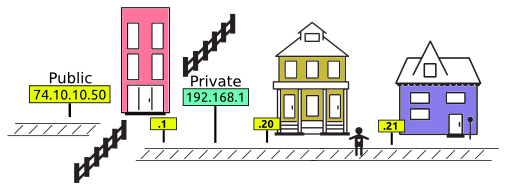Routers do the majority of the hard work on a network - they make the decisions about all the messages that travel on the network, and whether to pass messages to and from outside networks. There are three main functions:
Separate and Bridge
Routers separate networks into sections, or bridge different networks together, as we see in the example above—the private network of 192.168.1 Street is bridged to the Internet with a public IP address.
| |
Assign IPs
They can assign IP addresses. In the example of 192.168.1 Street, if a new house is built on the street, it would get whatever the next highest house number available. In the case of routers, they assign IP addresses using DHCP—Dynamic Host Configuration Protocol.
| |
Firewall and Protect
They can filter messages or keep users out of private networks. Most routers have a Firewall built in. This is a software function that keeps unwanted messages from reaching the computers on the inside, or private part, of the network.
|
Let us take another look at 192.168.1 Street, and the postal service building we included when it had a public address for the entire street. As it turns out, that postal service building is acting as a Router.

In this case, the postal service building is routing messages between the rest of the Internet using its public address and the street with private addresses.
Comments
Post a Comment